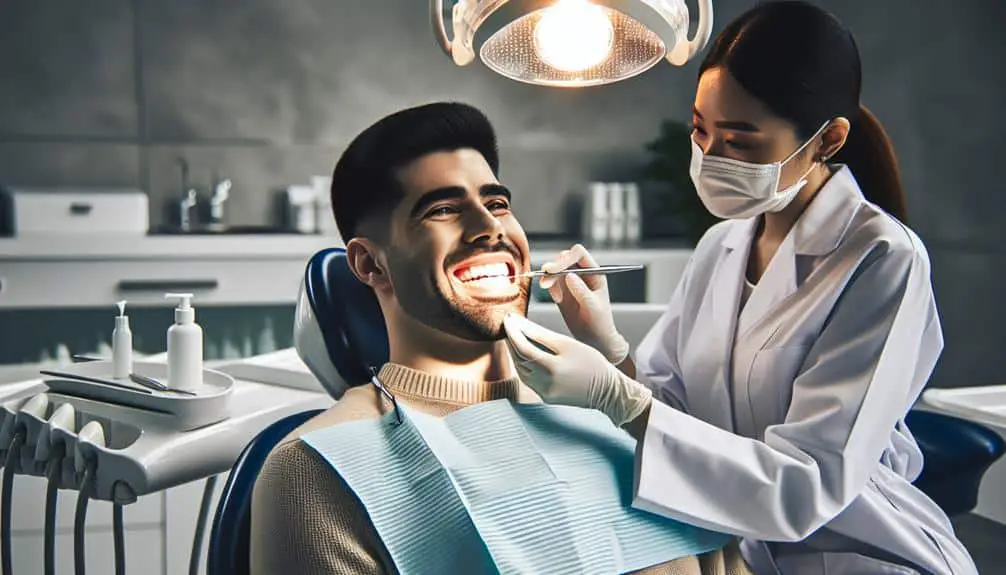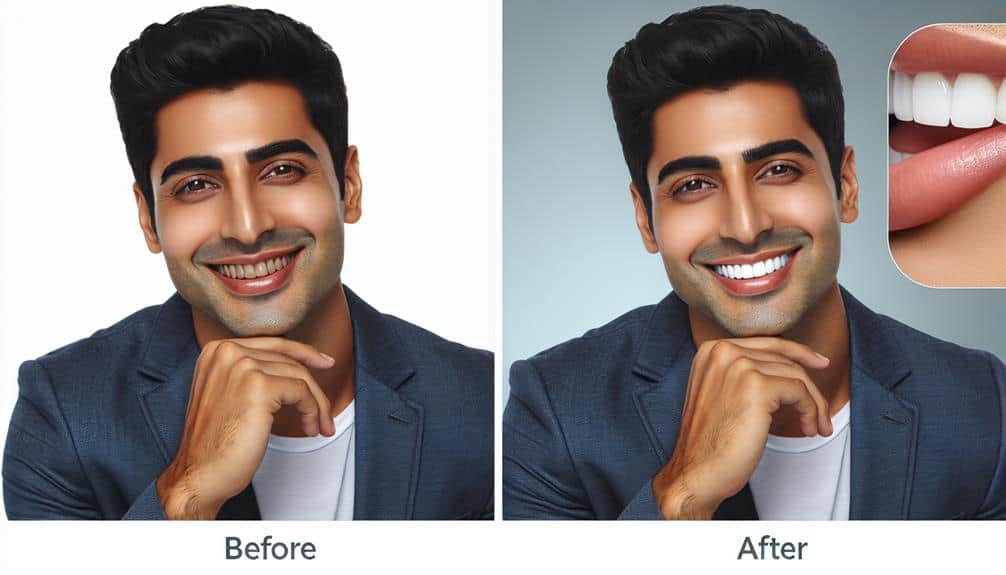Professional teeth whitening procedures come with risks that you should be aware of. The chemicals used can heighten tooth sensitivity by irritating the nerves, possibly causing pain. Gum irritation and damage are common too, with the potential for chemical burns if not applied correctly. Enamel erosion, uneven whitening results, and overuse of whitening agents can also impact your oral health. To better understand these risks and how to mitigate them, explore further into the details provided.
Key Points
- Tooth sensitivity can increase due to peroxide penetrating enamel and irritating nerves.
- Gum irritation may occur from bleaching agents, potentially causing chemical burns.
- Enamel erosion is a risk, especially with acidic substances and teeth grinding habits.
- Uneven whitening results can stem from varying concentrations and application methods.
- Overuse of whitening agents can lead to discoloration, enamel breakdown, and persistent sensitivity.
Potential Tooth Sensitivity
If you undergo professional teeth whitening, you may experience heightened tooth sensitivity as a common side effect of the treatment. This sensitivity occurs because the peroxide-based whitening agents used in these procedures can penetrate the enamel and irritate the nerves inside the tooth. However, there are ways to manage this discomfort and minimize its impact on your daily life.
Pain management techniques can help alleviate the sensitivity you may experience after a whitening treatment. Over-the-counter pain relievers such as ibuprofen or acetaminophen can be effective in reducing any discomfort. Additionally, using toothpaste designed for sensitive teeth can help soothe the nerves and provide relief.
To prevent or reduce the likelihood of experiencing significant tooth sensitivity after professional teeth whitening, there are some suggestions to contemplate. Before the procedure, consult with your dentist about using a desensitizing toothpaste for a few weeks. This can help prepare your teeth for the treatment and reduce sensitivity. During the whitening process, your dentist may also apply a protective gel to your teeth to minimize sensitivity. Proper oral hygiene, including gentle brushing with a soft-bristled toothbrush and avoiding very hot or cold foods, can also aid in preventing heightened sensitivity.
Gum Irritation and Damage
Gum irritation and potential damage may occur as a result of professional teeth whitening procedures. When undergoing cosmetic dentistry treatments for a brighter smile, it's important to be mindful of the impact on oral health, particularly the gums. Here are some key points to keep in mind:
- Soft Tissue Irritation: The bleaching agents used in professional whitening procedures can sometimes lead to irritation of the delicate gum tissue surrounding the teeth.
- Chemical Burns: In some cases, the strong whitening solutions used during professional treatments can cause chemical burns on the gums if not applied carefully by a trained professional.
- Gum Sensitivity: The gums may become more sensitive following a teeth whitening session, making them prone to discomfort, especially when consuming hot or cold foods.
- Over-Whitening Effects: Excessive teeth whitening sessions can damage the gums, leading to recession and potential long-term issues if not monitored and controlled properly.
Prioritizing oral health and seeking professional guidance can help mitigate these risks associated with professional teeth whitening procedures.
Enamel Erosion
Enamel erosion can result from professional teeth whitening treatments, potentially compromising the strength and protective function of your teeth. This erosion occurs when the outer layer of the tooth, the enamel, is worn down by acidic substances. Acidic drinks like soda, citrus juices, and certain alcoholic beverages can contribute to this erosion. When enamel is weakened, it can lead to increased tooth sensitivity, discoloration, and even tooth decay.
In addition to acidic drinks, habits like grinding your teeth can exacerbate enamel erosion. The combination of teeth grinding and teeth whitening procedures can accelerate the wearing down of enamel, making your teeth more vulnerable to damage. It's important to be aware of these risks and take preventive measures to protect your enamel.
If you experience increased sensitivity or notice changes in the appearance of your teeth after professional whitening, consult with your dentist to address any concerns promptly and prevent further damage.
Uneven Whitening Results
Uneven whitening results can occur after professional teeth whitening treatments, potentially affecting the overall aesthetic outcome of your smile. This outcome may result from various factors related to the treatment process.
To guarantee a uniform and satisfactory result, consider the following:
- Color Consistency: The concentration of the whitening agent and its application method may impact how evenly your teeth whiten. Discuss with your dentist the best approach for achieving consistent results.
- Treatment Duration: Longer treatment durations don't always equate to better results. In fact, prolonged exposure to whitening agents can lead to uneven whitening and increased tooth sensitivity.
- Pre-existing Stains: Some types of stains may be more resistant to whitening treatments, which can result in uneven coloration across your teeth.
- Professional Expertise: The skill and experience of the dental professional performing the whitening procedure play a vital role in ensuring an even and aesthetically pleasing outcome.
To avoid uneven whitening results, it's essential to follow the recommendations of your dental professional regarding treatment duration and aftercare.
Overuse of Whitening Agents
Excessive use of whitening agents can lead to detrimental effects on your oral health and the appearance of your teeth. While it's important to desire a brighter smile, overusing whitening products can result in tooth discoloration rather than the intended whitening effect. The active ingredients in whitening agents, such as hydrogen peroxide, can break down the enamel and expose the inner dentin layer, causing a blotchy or uneven appearance on your teeth.
Furthermore, overuse of whitening agents can lead to increased tooth sensitivity. The harsh chemicals in these products can irritate the nerves within the teeth, resulting in discomfort or pain when consuming hot or cold foods and beverages. This heightened sensitivity can persist even after discontinuing the use of whitening agents, impacting your overall oral health and quality of life.
To maintain both the health and aesthetics of your teeth, it's vital to follow recommended guidelines and consult with a dental professional before starting any whitening regimen. Prioritizing the long-term health of your teeth over immediate cosmetic results can prevent potential issues with tooth discoloration and maintain the best oral health.
Frequently Asked Questions
Can Professional Teeth Whitening Procedures Cause Any Long-Term Damage to the Gums?
Professional teeth whitening procedures can have long-term implications on gum health. The process, if not done properly, can lead to gum irritation, sensitivity, and even damage. It's essential to choose a skilled professional to minimize these risks.
How Do Professional Teeth Whitening Procedures Affect the Strength and Health of Tooth Enamel Over Time?
Brightening your smile through professional teeth whitening may temporarily weaken enamel due to the bleaching agents used. Over time, repeated procedures without proper care can lead to enamel erosion, affecting tooth strength.
Are There Any Potential Risks or Side Effects Associated With Uneven Whitening Results From Professional Procedures?
When professional teeth whitening results show inconsistency, it may indicate safety or effectiveness issues with the product used. Uneven results can impact your satisfaction. Ensuring a proper procedure and product choice is crucial.
What Are the Dangers of Overusing Whitening Agents During Professional Teeth Whitening Treatments?
Beware the allure of excessive whitening, for in its pursuit lies peril. Overuse of whitening agents may lead to toxicity, risking gum health. Proper sensitivity management is essential to safeguard your oral well-being.
How Can Individuals Minimize the Risk of Tooth Sensitivity After Undergoing a Professional Teeth Whitening Procedure?
To minimize tooth sensitivity after professional teeth whitening, follow post-treatment care instructions diligently. Use desensitizing toothpaste, avoid extremely hot or cold foods, and apply fluoride treatments. Protect enamel by limiting acidic foods and drinks. Prioritize pain prevention and enamel protection for best results.
Conclusion
To wrap up, while professional teeth whitening procedures can provide effective results, it's important to be mindful of the potential risks involved. Tooth sensitivity, gum irritation, enamel erosion, uneven whitening results, and overuse of whitening agents are all factors to take into account.
It's essential to consult with a dental professional before undergoing any whitening treatment to guarantee the safety and health of your teeth. Keep in mind, your smile is worth protecting.



